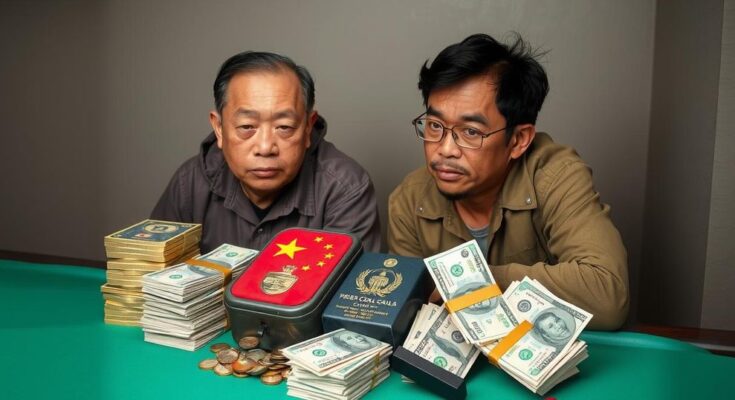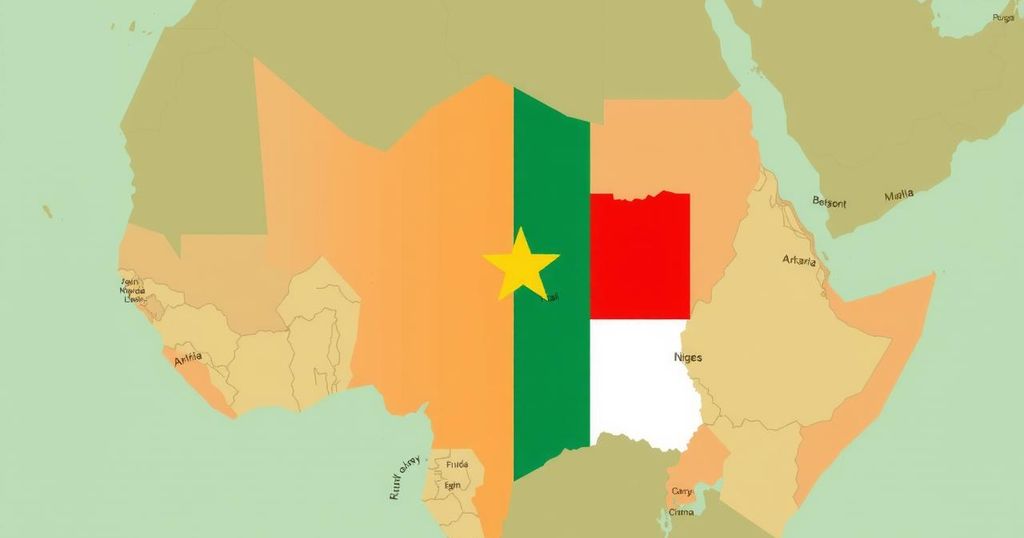Three Chinese nationals were arrested in the Democratic Republic of Congo for possessing 12 gold bars and $800,000 in cash. The discovery occurred in South Kivu province following a covert operation amid ongoing concerns regarding illegal mining and the exploitation of the region’s mineral resources. DR Congo continues to face challenges associated with militia control over mining operations, exacerbating instability and corruption in the sector.
In the eastern region of the Democratic Republic of Congo (DR Congo), three Chinese nationals were apprehended in connection with possession of 12 gold bars and approximately $800,000 in cash. According to Jean Jacques Purusi, the governor of South Kivu province, the currency and gold were concealed within the vehicle they were using. This operation was conducted discreetly following the controversial release of another group of Chinese individuals linked to an illegal gold mining operation in the vicinity.
The eastern part of DR Congo is rich in natural resources, including gold and diamonds, yet these mineral riches have been exploited by foreign entities since colonial times, significantly contributing to the area’s persistent instability over the past three decades. Militia factions often control many mining operations, leading to wealth accumulation among their leaders who sell the mined resources to intermediaries.
Governor Purusi emphasized the necessity for secrecy regarding this recent operation, attributing it to prior instances where influential local figures had connections with mineral dealers. Following a reliable tip-off, a thorough search was conducted in the Walungu region, leading to the discovery of the concealed wealth. While specific details regarding the gold amount seized remained undisclosed, he reflected on the aforementioned alarming release of 17 Chinese nationals earlier, echoing his concerns over the challenges faced in reforming DR Congo’s notoriously corrupt mining sector. A sum totaling $10 million in taxes and fines was owed by this previous group to the government.
The Chinese embassy has not publicly responded to the recent allegations. These arrests coincide with ongoing conflicts in the neighboring North Kivu province, where a rebel group backed by Rwanda has taken control of significant territories. Additionally, DR Congo has initiated legal action against Apple over the sourcing of “blood minerals,” alleging that these resources are laundered through international supply chains, perpetuating conflict and violence while contributing to human rights abuses like forced child labor.
The Democratic Republic of Congo possesses vast natural resource wealth including gold, diamonds, and minerals essential for modern technology, such as those used in mobile phones and electric vehicles. However, this abundance has led to a protracted history of conflict and exploitation, particularly from foreign entities that have profited from its rich resources, creating a turbulent socio-political environment. Numerous militia groups operate within these mineral-rich regions, complicating governance and regulatory efforts, as they maintain lucrative relationships with influential local and foreign individuals. As a result, the DR Congo has struggled with corruption and illegal mining activities, making reform efforts vital yet challenging.
In summary, the recent arrest of three Chinese nationals in DR Congo highlights the ongoing issues related to illegal mining and the exploitation of the country’s mineral resources. The clandestine operation underscores the complexities involved in curbing corruption and promoting accountability within this sector. Amid persistent violence and turmoil, initiatives aimed at reforming the mining landscape remain imperative to ensure the protection of human rights and environmental integrity.
Original Source: www.bbc.co.uk




